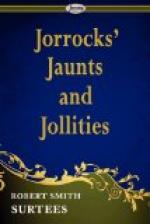“Well, but tell me, gentlemen, where do we dine?” inquired Jorrocks, turning to a group who had just approached the fire-engine. “We don’t know yet,” said a gentleman in scarlet, “the deer has not come yet; but yonder he is,” pointing up the road to a covered cart, “and there are the hounds just coming over the hill at the back.” The covered cart approached, and several went to meet it. The cry of “Oh, it’s old Tunbridge,” was soon heard. “Well, we shall have a good dinner,” said Jorrocks, “if that is the case. Is it Tunbridge?” inquired he eagerly of one of the party who returned from the deer-cart. “Yes, it’s old Tunbridge, and Snooks has ordered dinner at the Wells for sixteen at five o’clock, so the first sixteen that get there had better look out.” “Here, bouy,” said Jorrocks in an undertone to his servant, who was leading his screws about on the green, “take this ’oss out of the carriage, and give him a feed of corn, and then go on to Tunbridge Wells, and tell Mr. Pegg, at the Sussex Arms, that I shall be there with a friend to the dinner, and bid him write ‘Jorrocks’ upon two plates and place them together.—Nothing like making sure,” said he, chuckling at his own acuteness.
“Now to ’orse—to ’orse!” exclaimed he, suiting the action to the word, and climbing on to his great chestnut, leaving the Yorkshireman to mount the rat-tail brown. “Let’s have a look at the ’ounds”, turning his horse in the direction in which they were coming. Jonathan Griffin[16] took off his cap to Jorrocks, as he approached, who waved his hand in the most patronising manner possible, adding “How are you, Jonathan?” “Pretty well, thank you, Mister Jorrocks, hope you’re the same.” “No, not the same, for I’m werry well, which makes all the difference—haw! haw! haw! You seem to have but a shortish pack, I think—ten, twelve, fourteen couple—’ow’s that? We always take nine and twenty with the Surrey”. “Why, you see, Mister Jorrocks, stag-hunting and fox-hunting are very different. The scent of the deer is very ravishing, and then we have no drawing for our game. Besides, at this season, there are always bitches to put back—but we have plenty of hounds for sport.—I suppose we may be after turning out,” added Jonathan, looking at his watch—“it’s past eleven.”
[Footnote 16: Poor Jonathan, one of the hardest riders and drinkers of his day, exists, like his pack, but in the recollection of mankind. He was long huntsman to the late Lord Derby, who, when he gave up his staghounds, made Jonathan a present of them, and for two or three seasons he scratched on in an indifferent sort of way, until the hounds were sold to go abroad—to Hungary, we believe.]




